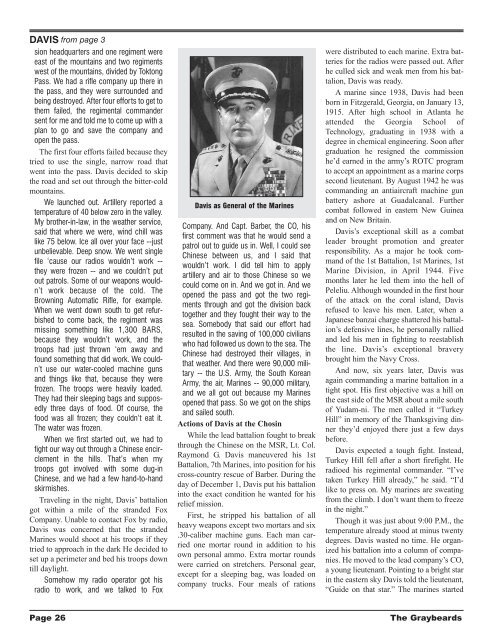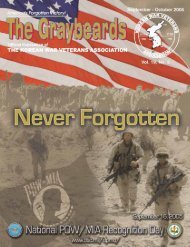GENERAL RAYMOND G. DAVIS - Korean War Veterans Association
GENERAL RAYMOND G. DAVIS - Korean War Veterans Association
GENERAL RAYMOND G. DAVIS - Korean War Veterans Association
You also want an ePaper? Increase the reach of your titles
YUMPU automatically turns print PDFs into web optimized ePapers that Google loves.
<strong>DAVIS</strong> from page 3<br />
sion headquarters and one regiment were<br />
east of the mountains and two regiments<br />
west of the mountains, divided by Toktong<br />
Pass. We had a rifle company up there in<br />
the pass, and they were surrounded and<br />
being destroyed. After four efforts to get to<br />
them failed, the regimental commander<br />
sent for me and told me to come up with a<br />
plan to go and save the company and<br />
open the pass.<br />
The first four efforts failed because they<br />
tried to use the single, narrow road that<br />
went into the pass. Davis decided to skip<br />
the road and set out through the bitter-cold<br />
mountains.<br />
We launched out. Artillery reported a<br />
temperature of 40 below zero in the valley.<br />
My brother-in-law, in the weather service,<br />
said that where we were, wind chill was<br />
like 75 below. Ice all over your face --just<br />
unbelievable. Deep snow. We went single<br />
file ‘cause our radios wouldn’t work --<br />
they were frozen -- and we couldn’t put<br />
out patrols. Some of our weapons wouldn’t<br />
work because of the cold. The<br />
Browning Automatic Rifle, for example.<br />
When we went down south to get refurbished<br />
to come back, the regiment was<br />
missing something like 1,300 BARS,<br />
because they wouldn’t work, and the<br />
troops had just thrown ‘em away and<br />
found something that did work. We couldn’t<br />
use our water-cooled machine guns<br />
and things like that, because they were<br />
frozen. The troops were heavily loaded.<br />
They had their sleeping bags and supposedly<br />
three days of food. Of course, the<br />
food was all frozen; they couldn’t eat it.<br />
The water was frozen.<br />
When we first started out, we had to<br />
fight our way out through a Chinese encirclement<br />
in the hills. That’s when my<br />
troops got involved with some dug-in<br />
Chinese, and we had a few hand-to-hand<br />
skirmishes.<br />
Traveling in the night, Davis’ battalion<br />
got within a mile of the stranded Fox<br />
Company. Unable to contact Fox by radio,<br />
Davis was concerned that the stranded<br />
Marines would shoot at his troops if they<br />
tried to approach in the dark He decided to<br />
set up a perimeter and bed his troops down<br />
till daylight.<br />
Somehow my radio operator got his<br />
radio to work, and we talked to Fox<br />
Davis as General of the Marines<br />
Company. And Capt. Barber, the CO, his<br />
first comment was that he would send a<br />
patrol out to guide us in. Well, I could see<br />
Chinese between us, and I said that<br />
wouldn’t work. I did tell him to apply<br />
artillery and air to those Chinese so we<br />
could come on in. And we got in. And we<br />
opened the pass and got the two regiments<br />
through and got the division back<br />
together and they fought their way to the<br />
sea. Somebody that said our effort had<br />
resulted in the saving of 100,000 civilians<br />
who had followed us down to the sea. The<br />
Chinese had destroyed their villages, in<br />
that weather. And there were 90,000 military<br />
-- the U.S. Army, the South <strong>Korean</strong><br />
Army, the air, Marines -- 90,000 military,<br />
and we all got out because my Marines<br />
opened that pass. So we got on the ships<br />
and sailed south.<br />
Actions of Davis at the Chosin<br />
While the lead battalion fought to break<br />
through the Chinese on the MSR, Lt. Col.<br />
Raymond G. Davis maneuvered his 1st<br />
Battalion, 7th Marines, into position for his<br />
cross-country rescue of Barber. During the<br />
day of December 1, Davis put his battalion<br />
into the exact condition he wanted for his<br />
relief mission.<br />
First, he stripped his battalion of all<br />
heavy weapons except two mortars and six<br />
.30-caliber machine guns. Each man carried<br />
one mortar round in addition to his<br />
own personal ammo. Extra mortar rounds<br />
were carried on stretchers. Personal gear,<br />
except for a sleeping bag, was loaded on<br />
company trucks. Four meals of rations<br />
were distributed to each marine. Extra batteries<br />
for the radios were passed out. After<br />
he culled sick and weak men from his battalion,<br />
Davis was ready.<br />
A marine since 1938, Davis had been<br />
born in Fitzgerald, Georgia, on January 13,<br />
1915. After high school in Atlanta he<br />
attended the Georgia School of<br />
Technology, graduating in 1938 with a<br />
degree in chemical engineering. Soon after<br />
graduation he resigned the commission<br />
he’d earned in the army’s ROTC program<br />
to accept an appointment as a marine corps<br />
second lieutenant. By August 1942 he was<br />
commanding an antiaircraft machine gun<br />
battery ashore at Guadalcanal. Further<br />
combat followed in eastern New Guinea<br />
and on New Britain.<br />
Davis’s exceptional skill as a combat<br />
leader brought promotion and greater<br />
responsibility. As a major he took command<br />
of the 1st Battalion, 1st Marines, 1st<br />
Marine Division, in April 1944. Five<br />
months later he led them into the hell of<br />
Peleliu. Although wounded in the first hour<br />
of the attack on the coral island, Davis<br />
refused to leave his men. Later, when a<br />
Japanese banzai charge shattered his battalion’s<br />
defensive lines, he personally rallied<br />
and led his men in fighting to reestablish<br />
the line. Davis’s exceptional bravery<br />
brought him the Navy Cross.<br />
And now, six years later, Davis was<br />
again commanding a marine battalion in a<br />
tight spot. His first objective was a hill on<br />
the east side of the MSR about a mile south<br />
of Yudam-ni. The men called it “Turkey<br />
Hill” in memory of the Thanksgiving dinner<br />
they’d enjoyed there just a few days<br />
before.<br />
Davis expected a tough fight. Instead,<br />
Turkey Hill fell after a short firefight. He<br />
radioed his regimental commander. “I’ve<br />
taken Turkey Hill already,” he said. “I’d<br />
like to press on. My marines are sweating<br />
from the climb. I don’t want them to freeze<br />
in the night.”<br />
Though it was just about 9:00 P.M., the<br />
temperature already stood at minus twenty<br />
degrees. Davis wasted no time. He organized<br />
his battalion into a column of companies.<br />
He moved to the lead company’s CO,<br />
a young lieutenant. Pointing to a bright star<br />
in the eastern sky Davis told the lieutenant,<br />
“Guide on that star.” The marines started<br />
Page 26<br />
The Graybeards

















